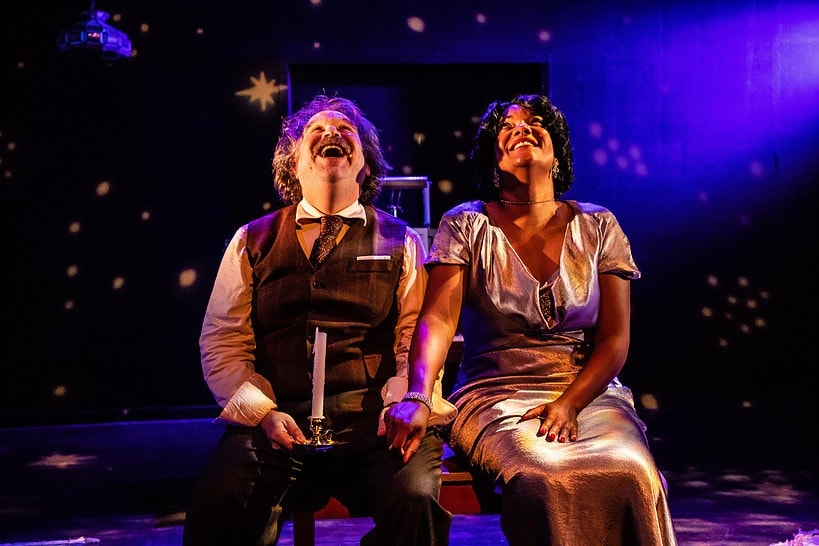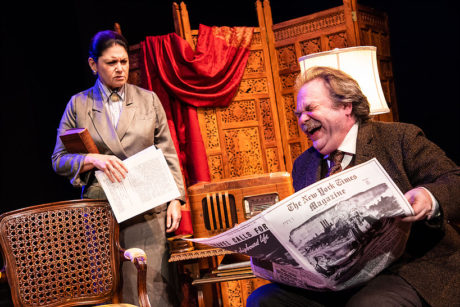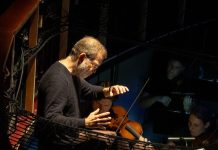Secrets of the Universe (And Other Songs), a new play by Marc Acito having its world premiere at the Hub Theatre in Fairfax, explores the friendship between two 20th century greats in very different fields: theoretical physicist Albert Einstein and concert singer Marian Anderson. The friendship was real.

The play’s first act centers on their first meeting in 1937, while the second act takes them from 1939 through Einstein’s death in 1955. Acito’s script imagines what the pair’s interactions might have been like, given what is known about their lives and personalities.
Learning that Anderson (Lolita Marie) had been denied a whites-only hotel room in Princeton, New Jersey, following a 1937 concert, Einstein (Sasha Olinick) – a vocal advocate of civil rights for African-Americans (though, it turns out, with disturbingly prejudiced views of Chinese and other Asians) – invites her to stay at his home.
Over this and subsequent visits, conversation ensues, about religion (she is Christian, he is an agnostic); fidelity, or its absence, in relationships; race; and the nature of the universe. The conversation is often witty, often warm, and sometimes contentious, in the way that good friends, both kind, with very different life experiences, can disagree without being disagreeable.
Einstein has been called a cartoonist’s dream come true, and Acito’s/Olinick’s Einstein is often faithful to that cartoon: frizzy hair, rumpled clothes, absent-minded, jokey. Few genuinely great men have been so saddled with the image of being cute.
Like many incomplete pictures, this view of the man has some basis in fact. Robert Oppenheimer, in a 1966 New York Review of Books article, said that with Einstein there was always “a wonderful purity at once childlike and profoundly stubborn…The sense of grandeur never left him for a minute, nor his sense of humor.” But, perhaps in order to inject additional humor into the play, Acito sometimes clings too closely to the cuteness, such as in an extended fart joke in the first act.
The play does, however, illuminate some aspects of Einstein that may be less matters of popular myth. Acito and Olinick highlight Einstein’s talent for friendship and his abiding frustration and disappointment with what turned out to be a quixotic quest for a “unified field theory” of physics.

There is an almost tragic aspect to the phase of Einstein’s life during the years covered by the play. His stunningly great, original, creative work was behind him (his papers on relativity were published in 1905-1915). He enjoyed unparalleled celebrity, but he was increasingly isolated from the mainstream of theoretical physics.
Oppenheimer commented that it was important “to start to dispel the clouds of myth [surrounding Einstein] and to see the great mountain peak that these clouds hide. As always, the myth has its charms; but the truth is far more beautiful.” Perhaps some changes in emphasis would have helped Secrets of the Universe better achieve that goal, providing a portrait more closely approaching in depth that of Einstein’s contemporary, and scientific rival, Niels Bohr in Michael Frayn’s brilliant Copenhagen.
On the other hand, Acito’s and Marie’s characterization of Anderson is gorgeous in every respect. A diva, yes, full of confidence from worldwide acclaim on the concert circuit yet never losing her considerable stage fright; a woman of grandeur and dignity who is never allowed to forget the pain of racism; someone whose art is as much a lifeline as a calling; someone whose deep faith informs her art.
One of the script’s virtues is that it allows Anderson to hold her own, in wit and insight, with the famous physicist, and to collaborate with him in finding the commonalities in their views of life and the universe. Like Einstein, capable of strong, long-lasting friendships (one in particular with Jean Sibelius), she shared with him the essential loneliness of someone whose deepest devotion was to his or her work.
Marie’s finest moment was a second act monologue in which she responds to Einstein’s criticism of her for not being more politically active in civil rights matters by recounting for him the never-ending experience of American racism that even a black celebrity faced. Later in the act, she even gets to tell the show’s best joke. Jane Fink’s costumes for Anderson, especially a satin gown in the second act, are every bit as beautiful as Marie’s portrayal.
In what is at heart a two-hander, there are three supporting actors. Mindy Shaw capably plays Helen Dukas, Einstein’s faithful and formidable maid/assistant. Brian Keith Macdonald plays Kosti Vehanen, Anderson’s Finnish accompanist, who, in his relatively brief scenes, develops a thoroughly credible personal and professional relationship with the singer. (In his scenes with Kosti, Einstein displays an unerring gaydar, which, even given his genius, stretches credulity a bit.) Jonathan Del Palmer plays a variety of small characters, most notably Anderson’s husband, a successful architect to whom Anderson was married for 43 years and who the script treats too dismissively.
The three supporting actors play other minor roles, such as Franklin and Eleanor Roosevelt, Jackie Robinson, and Mary Bethune, who appear to the main characters in imagined sequences, to little effect in helping to develop the central relationship of the play. At one point, the characters dance around in a circle (Kosti with a rose stem in his mouth) in an annoyingly distracting moment that might better have been omitted.
The outstanding feature of Betsy Zuck’s set is a semi-sheer fabric hanging over the stage, sometimes seeming to be a cloud, other times illuminated in varying colors in Kristin Thompson lighting design. Einstein’s living room, where most of the action takes place, is done in cozy furniture (at one point, Anderson comments, somewhat caustically, about how comfortable it is), with a piano at the center.
Though the play is subtitled “and other songs,” most of the singing in the production consists of somewhat altered snatches of Anderson’s performances in Matthew R. Nielson’s sound design. Anderson and Einstein do get to sing a bit at the very end of the show.
Running Time: Two hours and 15 minutes, with one intermission.
Secrets of the Universe (And Other Songs) plays through July 29, 2018, at the Hub Theatre in The New School – 9431 Silver King Court, in Fairfax VA. For tickets, call the box office at 703-674-3177, or go online.




